In recent years at least 1,400 local news publications, most of them digital, have begun to fill America’s large and growing local news desert. But are they really “greening” that desert by filling it with legitimate local news? Or are they just trying to exploit it financially and politically?
As documented in The New York Times, the Chicago Tribune and the Tow Center for Digital Journalism at Columbia Journalism School, most of those sites are funded by rightwing individuals or organizations. (A left-of-center organization is behind nine of the local news sites.) Less discussed are the 174 news sites focused on American cities and states managed by interconnected companies headquartered in Dubai, Bahrain, and Sydney, Australia.
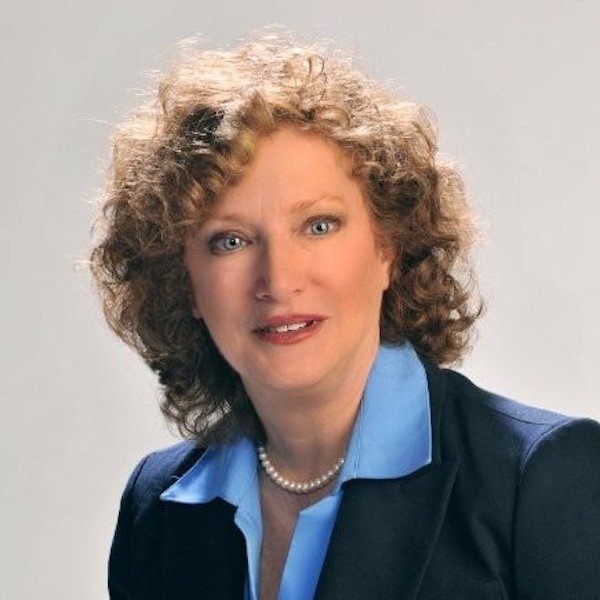
These hyper-partisan news sites have launched as the United States has seen a sharp decline in local newspapers and websites. For example, the 2020 issue of “The Expanding News Desert,” a report by Penelope Muse Abernathy of the University of North Carolina Hussman School of Journalism, states that over the past 15 years, the United States “has lost 2,100 newspapers, leaving at least 1,800 communities that had a local news outlet in 2004 without any at the beginning of 2020.”
Those were local newspapers that reported on high school sports, local business openings, the deaths of prominent residents, and what would be happening on Halloween and Christmas. But most importantly, they also were the go-to place for people who wanted to know what their city, county or state government was (or wasn’t) doing about important issues, like crime and real estate development. Sometimes, their publishers were people a reader might run into at a local restaurant or community event and could call or email to share a story idea (or a complaint.)
That’s the sort of coverage that is hard, if not impossible, to find in the newcomer news sites, some of which claim to be covering communities where a traditional local newspaper still exists. So, why do these sites exist? How do they generate the revenue they need to survive? And what is their impact on the remaining traditional publications and the communities the newcomers purport to serve?
The investigations by the Times, the Tribune and the Tow Center have revealed that most of the newcomers are part of networks operated by entities like Metric Media, LocalLabs, Franklin Archer, the Record Inc., Star News Digital Media and Local Government Information Services (LGIS), all with connections to and funding from conservative organizations and individuals.
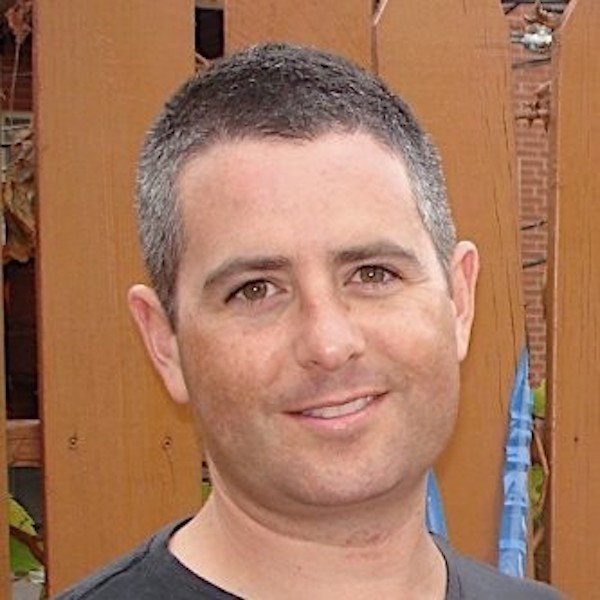
In addition to their conservative political affiliations, most of those networks have a relationship with Brian Timpone. Timpone is a former TV journalist and media entrepreneur who has launched some of those sites with support from organizations like Liberty Principles, a political action committee whose stated mission is to elect more Republicans in Illinois.
On the other side of the political spectrum is Courier, or CourierNewsroom.com, a left-of-center company with a similar mission, which publishes news sites focused on eight of what it has identified as national election “swing states,” such as Arizona, Florida, Iowa, Michigan, North Carolina, Ohio, Pennsylvania, Virginia and Wisconsin.
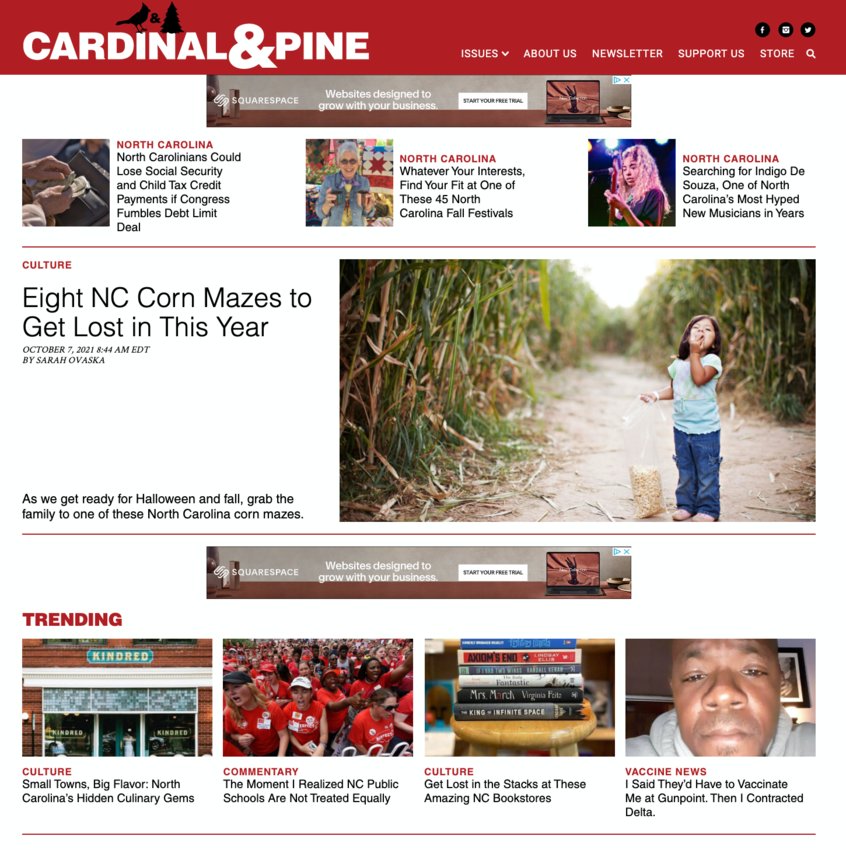
With ties to Democrat operatives, Courier was founded in 2019, ahead of the 2020 midterm elections, by Tara McGowan, a Democratic strategist who worked on Barack Obama's re-election campaign. While Courier Newsroom is a for-profit entity, it has received $25 million in donations from liberal backers, like the billionaire investor George Soros, LinkedIn co-founder Reid Hoffman and Laurene Powell Jobs, the majority owner of The Atlantic. It also solicits contributions from its readers; however, they are not tax-deductible.
The news sites owned by foreign corporations include Big News Network, headquartered in Dubai in the United Arab Emirates. It describes itself as the “largest online news service on the Web” and boasts that it uses “unique spidering software” to generate content and links from thousands of other sites. Then, it publishes that content on its own 500 news sites (174 of which are focused on U.S. cities and states). Those sites are managed by Midwest Radio Network in Sydney and Mainstream Media in Bahrain.
These news sites don’t appear to be taking revenue from legacy news media. Few of them seem to carry any advertisements for local businesses, and most of them instead have ads placed by Google AdSense or other contextual advertising networks. Google AdSense advertisements placed on an extensive network of hyperlocal news sites are likely to generate traffic because of the size of the overall audience they reach. But a local business is unlikely to advertise to reach an audience outside its market.
Some sites, like the seven published by Star News Digital Media, carry politically oriented advertising, such as an ad promoting an investment services firm that offers “socially conservative investment options” and an ad promoting Steve Bannon's “Bannon's War Room” on Rumble, the online video platform. Those sites are focused on Florida, Georgia, Michigan, Minnesota, Ohio, Tennessee and Virginia, which Star News describes as “battleground states.” Star News was founded in 2017 by three people — Michael Patrick Leahy, Steve Gill and Christina Botteri — connected with conservative political groups like the Tea Party.
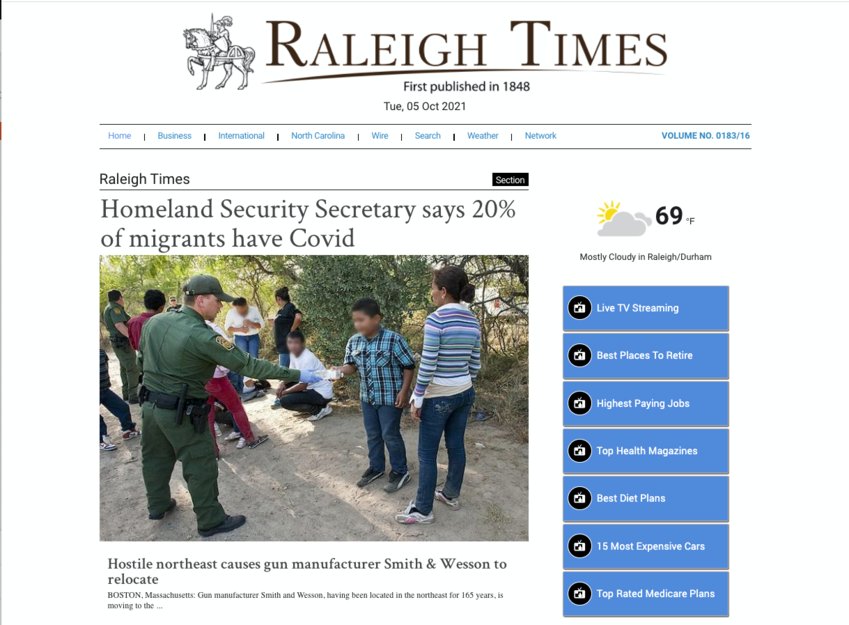
Seven sites purport to offer the news of Raleigh and Wake County, North Carolina, with one managed by the Australian Midwest Radio Network and six others by Metric Media, which Brian Timpone controls. One is Midwest Radio Network’s RaleighTimes.com, launched in 2002, which appropriated the name of the 110-year-old newspaper owned by The News & Observer that closed in 1989. Despite the proliferation of such news sites in Wake County, Patti Vargas, vice president for advertising for the Raleigh News & Observer, said it hasn’t been affected financially. “It doesn’t have an impact on our advertising revenue,” Vargas said. RaleighTimes.com uses contextual advertising posted by Media.net, which Miteno Communication Technology of Beijing owns.
In a telephone interview, Brian Timpone says he doesn’t believe the conservative news sites he controls impact the advertising revenue of local legacy media. “The newspaper business revenue model — they make money on things we don’t do,” he said, citing publication of print ads, advertising inserts, subscription paywalls and conventional digital ads.
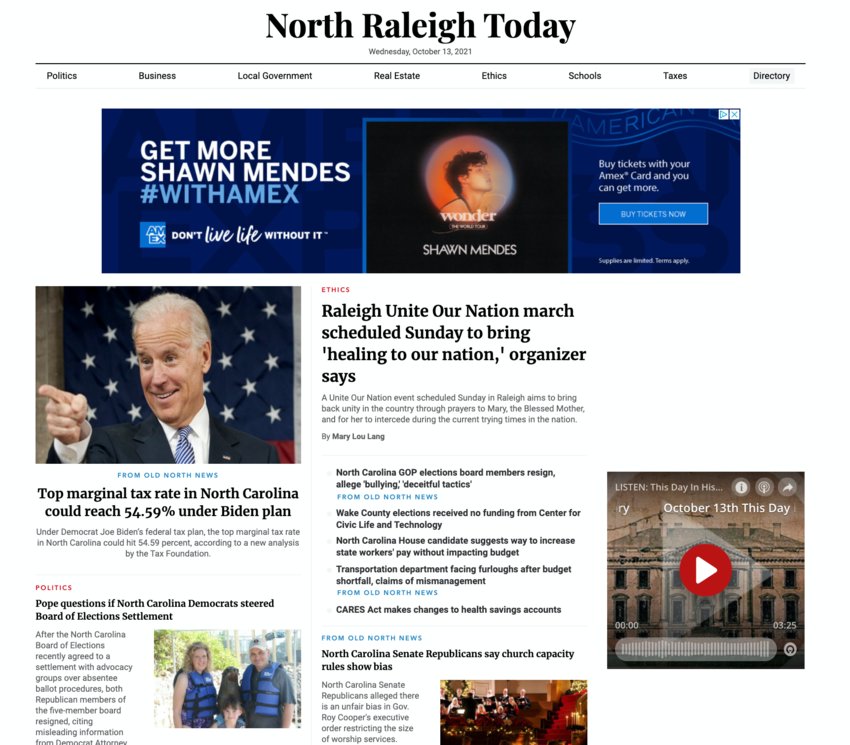
His news sites carry ads placed by Google AdSense. Still, Timpone said his focus is on producing content relevant to a particular advertiser and aggregating an audience to read that content. “Our sponsors come to us and say we’d like to attract these types of people. What kind of news can you create that is going to attract them?”
The more than 900 local news sites controlled by Metric Media publish links to local newspaper stories and television station news stories, as well as press releases. They also publish many stories based on publicly available data coming from Timpone’s LocalLabs. LocalLabs is the successor to Timpone’s Journatic, which sparked controversy when “This American Life,” the radio program, revealed that it was using freelancers from around the world for stories that were plagiarized or carried fake bylines.
LocalLabs publishes local Census data, ratings of local hospitals, local real estate sales, the salaries of local school teachers, the expirations of licenses of lawyers, the names of donors to political candidates, and the names of teachers who have signed a pledge to teach critical race theory — which has drawn sharp criticism, even from conservatives. In addition, several of its sites include a story promoting Acellus, an online teaching software product, which isn't labeled as sponsored content. Finally, as an indication of its political leaning, Media Metric’s Buffalo (New York) Ledger site continues to feature a November 2020 story about a Buffalo resident who thinks the presidential election was fraudulent.
The conservative Center Square, which publishes 39 news sites focused on specific states, carries Google ads and says it offers digital advertising targeted by geography, story topics and other key demographics. However, no such ads appeared in a recent review of those sites. Center Square is a project of the nonprofit Franklin News Foundation, which receives most of its revenue from donor-advised funds that don’t reveal the identity of their backers and is associated with the State Policy Network, a group of conservative and libertarian think tanks.
According to Bloomberg News, the left-leaning Courier Newsroom is not so much focused on building regular audiences for each site but on using social media, particularly Facebook, to direct particular articles from those sites to swing-state users and build a “custom audience.” While Courier Newsroom's stories have been described as accurate, they have been criticized for targeting specific audiences for political purposes. As an example, Courier Newsroom spent hundreds of thousands of dollars to promote negative stories about Donald Trump through Facebook. Bloomberg reports that Courier articles drew more than 25 million views in a single month. A review of traffic data for those sites shows that many had a surge in viewers before the November election and into December. Only one of the nine sites published by the left-leaning Courier Newsroom says on its site that it solicits advertising. Iowa Starting Line, which merged with Courier Newsroom in June of this year, emphasizes “the amount of influential actors in state and national politics and media that follow our website.”
As noted above, Midwest Radio Network used contextual advertising services provided by Beijing’s Media.net, suggesting that its 174 sites focused on American cities and states are also unlikely to harm legacy media by drawing advertising from local businesses.
One source of legacy media ad revenue that may be at risk is election campaign advertising, although Penny Abernathy thinks the impact might be most significant on local television stations. The National Conference of State Legislatures has reported that spending on digital political ads in the 2019-2020 election cycle was three times that in 2016. The shift of that spending from video to digital indeed may have a negative impact on traditional television advertising. But if that money isn’t siphoned off by the politically oriented and foreign digital news sites, it likely could benefit legacy publishers of local news sites.
Abernathy, who now is a visiting professor at Northwestern University Medill School of Journalism, said: “I view most of these sites as sleeping dogs that come to life around election time, or when there is a hot partisan issue. These sites are very different from those of the latter-day media barons. There is a total lack of transparency about who is funding them, how to contact anyone responsible for the site, or even whether the reporters doing the stories are located in this country.”
“So far, the real threat from these sites has been the spread of misinformation. As more and more election dollars transfer from TV to online, at least for now, these sites pose more of a revenue threat to local broadcast organizations than newspapers (which have historically received little revenue from candidates compared to TV).”
Abernathy said that spread of misinformation by these digital newcomers poses a risk to the integrity of local news media. The results of a Gallup poll released earlier this month (which sought Americans' opinions on all media — national and local) show that only 36% of Americans say they trust news media. “Between 1972 and 1976, 68% to 72% of Americans expressed trust in the mass media; yet, by 1997, when the question was next asked, trust had dropped to 53%,” Gallup reports. “Trust in the media, which has averaged 45% since 1997, has not reached the majority level since 2003.”
That integrity traditionally has been based on the principle that a news organization must “give the news impartially, without fear or favor, regardless of party, sect, or interests involved.” Adolph S. Ochs stated that principle on April 18, 1896, after he bought The New York Times. However, it took decades for the principle to be widely embraced.
Timpone argues that that integrity is long gone. “Newspapers built this faux independence from the newsroom, (that) the newsroom is full of people who were perfectly objective. ... But the newsrooms are all left-wing; there's no diversity of opinion,” he said.
Timpone is open about the fact that his news sites have an “advertiser-sponsored direction.” But he also emphasizes that the data-based stories they publish on things like teachers signing critical race theory petitions and people donating to political candidates are locally focused and that the data is accurate.
In an interview with the Chicago Tribune, Timpone said his publications reflected journalism in the 18th and 19th centuries when newspapers and reporters weren’t reluctant to promote political and cultural positions. “I'm a conservative Republican. I don't hide from it, and I never will,” he said. “You can call me biased. You can call me one-sided. ... I just don't lie about it. I try to be fair in my coverage.”
Stories on those sites managed by Dubai’s Big News Network focused on American states and cities don’t appear to contain content with a particular bias. However, Disinfo Lab, a nonprofit organization that investigates disinformation campaigns targeting the European Union, in 2019 published an investigation that revealed that fake negative content about Pakistan and China was distributed by Big News Network, which primarily targeted Indian residents.
The Center Square produces news that can be republished, with credit, by any other news organization. That news is said to be reported from 39 states (not including Alabama, Alaska, Arkansas, Hawaii, Idaho, Mississippi, North Dakota, Rhode Island, South Dakota, Utah and Vermont.) Its website lists only 10 reporters and five regional editors. The website also shows articles from several freelance contributors. While there is no evident bias in Center Square stories, its opinion pieces are from conservative sources, like Real Clear Wire's Sean Spicer, the Taxpayers Protection Alliance and the Center for Individual Freedom.
In an essay in Time magazine, Matthew Pressman, an assistant professor of journalism at Seton Hall University, wrote, “Trying to attract a mass audience with objective coverage, as newspapers did in the mid-20th century, is a fool’s errand — especially in a social-media age when provocative articles get shared more widely than studiously objective ones.”
But, Pressman wrote, “... those who see objectivity as a barrier to truth-telling are misunderstanding its requirements. It does not prevent journalists from making judgments about the news; it simply asks that those judgments be based on dispassionate analysis.”
“After studying the evolution of objectivity in American journalism, I’m rooting for it to survive. Fifty years ago, facing a similar crisis, the press adjusted but didn’t abandon its fundamental principles, and it led to what, in retrospect, was a golden age of journalism. The odds may be against it, but the same thing could happen today.”
Henry (Hank) Scott is a long-time journalist and media business executive whose Media-Maven LLC (www.Media-Maven.com) provides a variety of services to media startups and existing publishers.
Comments
No comments on this item Please log in to comment by clicking here